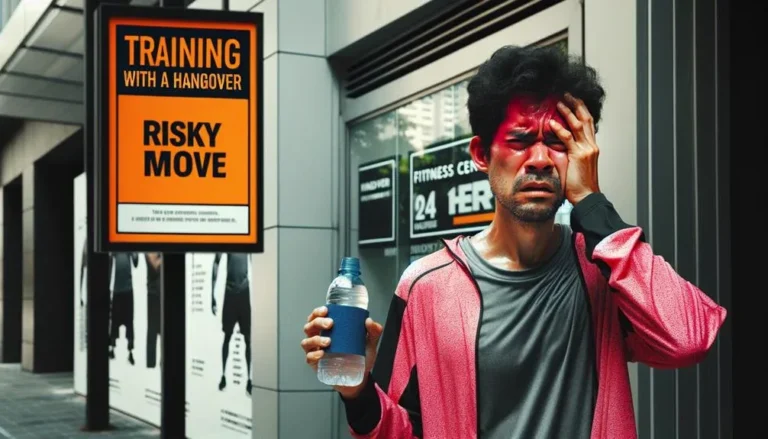Waking up with a pounding headache and a queasy stomach after a night of revelry is never fun, especially when you have a training session scheduled.
But have you ever wondered if pushing through that workout with a hangover is really worth it? The risks involved in training with a hangover go beyond just feeling a bit off; they can impact your performance and well-being in more ways than you might realize.
Let’s explore the consequences of this risky move and why it’s crucial to consider the implications before hitting the gym post-partying.
Key Takeaways
- Exercising with a hangover can lead to dehydration and health risks.
- Alcohol impairs performance and recovery, affecting training effectiveness.
- Hydration levels should be assessed before attempting any physical activity post-drinking.
- Prioritize rest and recovery over training when experiencing a hangover.
Hangover Symptoms and Exercise Performance
Exercising with a hangover can significantly impact performance and hinder training progress due to dehydration and decreased energy levels. When I push through a workout with a hangover, I notice a lack of strength and endurance. It feels like my body is struggling to keep up, making the session less effective.
Dehydration from alcohol consumption leaves me feeling sluggish and weak, affecting my ability to perform at my best. The pounding headache and nausea further distract me from focusing on proper form and technique.
Understanding how a hangover affects my body helps me make better decisions about when to rest and prioritize recovery. It’s essential to listen to my body’s signals and give it the care it needs to perform optimally.
Impact of Alcohol on Training
Alcohol consumption can significantly impact an athlete’s training performance and overall progress. As an athlete, I’ve learned that alcohol can interfere with muscle recovery, hydration levels, and sleep quality, all crucial aspects of training.
It can deplete essential nutrients and hinder the body’s ability to repair and strengthen muscles after workouts. Moreover, alcohol disrupts the body’s water balance, leading to dehydration, which impairs physical and cognitive functions during training.
The empty calories in alcohol can also sabotage nutritional goals, affecting energy levels and body composition. Understanding the impact of alcohol on training is vital for achieving peak performance and making progress towards fitness goals.
It’s essential to make informed choices about alcohol consumption to support optimal training outcomes.
Risks of Dehydration During Exercise
Dehydration poses significant risks to athletes during exercise, impacting performance and overall well-being. Staying hydrated is crucial for optimal performance and health. Here are some key points to consider:
- Fluid Balance: Maintaining a balance between fluid intake and sweat loss is essential for peak performance.
- Signs of Dehydration: Watch out for symptoms like dry mouth, fatigue, and dark urine, indicating dehydration.
- Performance Impacts: Dehydration can lead to decreased endurance, muscle cramps, and heat-related illnesses.
- Hydration Strategies: Develop a hydration plan, drink fluids before, during, and after exercise, and consider electrolyte replenishment for intense workouts.
Recovery Strategies Post-Drinking
Maintaining proper hydration post-drinking is essential for aiding recovery and replenishing the body’s water levels after alcohol consumption. Rehydrating with water or electrolyte-rich beverages can help alleviate dehydration symptoms like headaches and fatigue.
Consuming light, nutrient-dense meals can also support recovery by providing essential vitamins and minerals. Additionally, getting adequate rest and sleep can aid in the body’s recovery process post-drinking.
Engaging in gentle physical activity, such as stretching or a leisurely walk, can help improve circulation and promote overall well-being. By prioritizing hydration, nutrition, rest, and light movement, one can support their body in recovering effectively after a night of drinking, helping to get back on track for upcoming training sessions.
Adjusting Training Intensity Post-Hangover
After a night of indulging, adjusting training intensity post-hangover is crucial for optimizing recovery and performance. It’s essential to listen to your body and make necessary modifications to your workout routine.
Here are some key points to consider:
- Hydrate: Replenish lost fluids to aid in recovery and avoid dehydration.
- Modify Intensity: Lower the intensity of your workout to accommodate your body’s state and prevent overexertion.
- Focus on Mobility: Engage in light stretching or mobility exercises to promote blood flow and alleviate stiffness.
- Prioritize Rest: Allow yourself extra time to rest and recover to support your body’s healing process.
Importance of Well-being in Fitness
Recovery and overall well-being are integral components that significantly impact my fitness journey and performance outcomes. Prioritizing well-being goes beyond physical health; it encompasses mental and emotional wellness. Balancing exercise with rest, proper nutrition, and self-care is essential for sustained progress.
Listening to my body’s cues helps me tailor my training intensity and avoid burnout. Incorporating recovery strategies like active rest, stretching, and adequate sleep enhances my performance and reduces the risk of injury. Well-being also involves finding joy in the fitness journey, celebrating achievements, and learning from setbacks.
Conclusion
In conclusion, training with a hangover is like trying to run a race with a ball and chain attached to your ankle. It hinders performance, jeopardizes well-being, and ultimately sets you up for failure.
Prioritizing safety and health should always come first, and understanding the impact of alcohol on your body during exercise is crucial.
Listen to your body, take care of yourself, and remember that optimal performance starts with a clear mind and a well-rested body.
